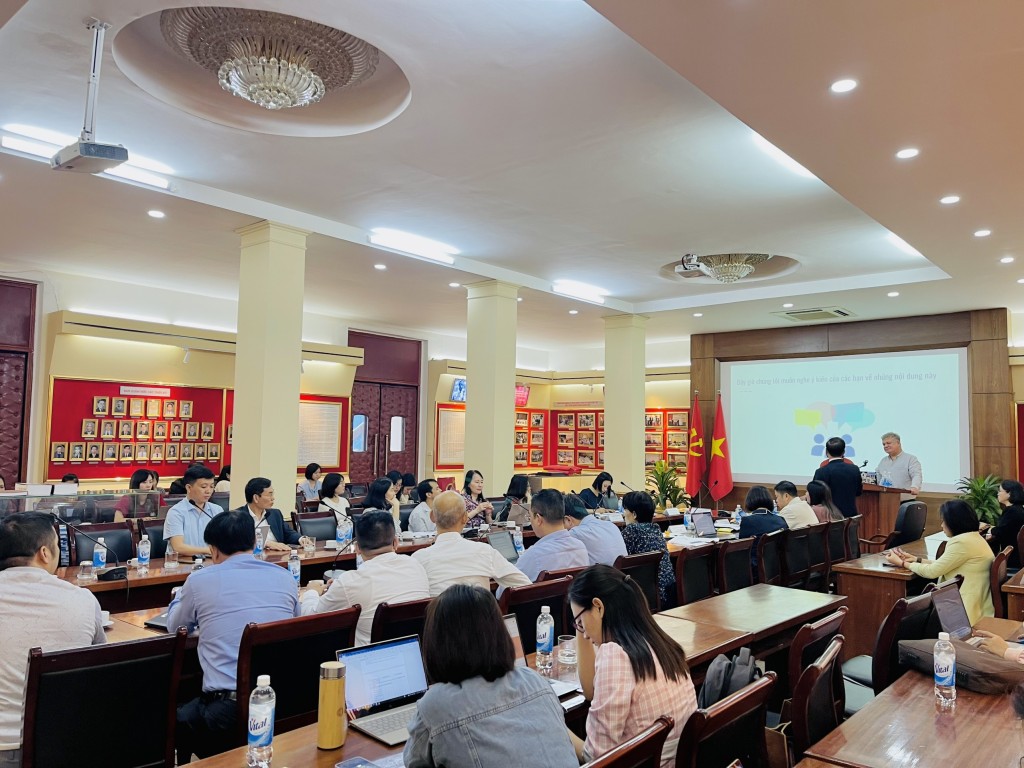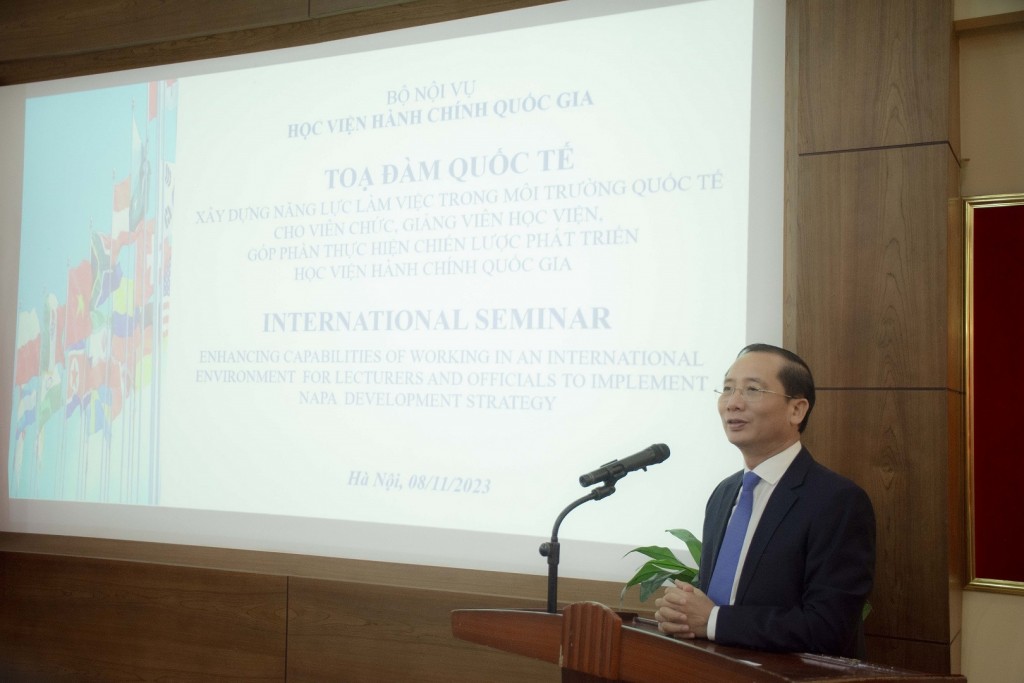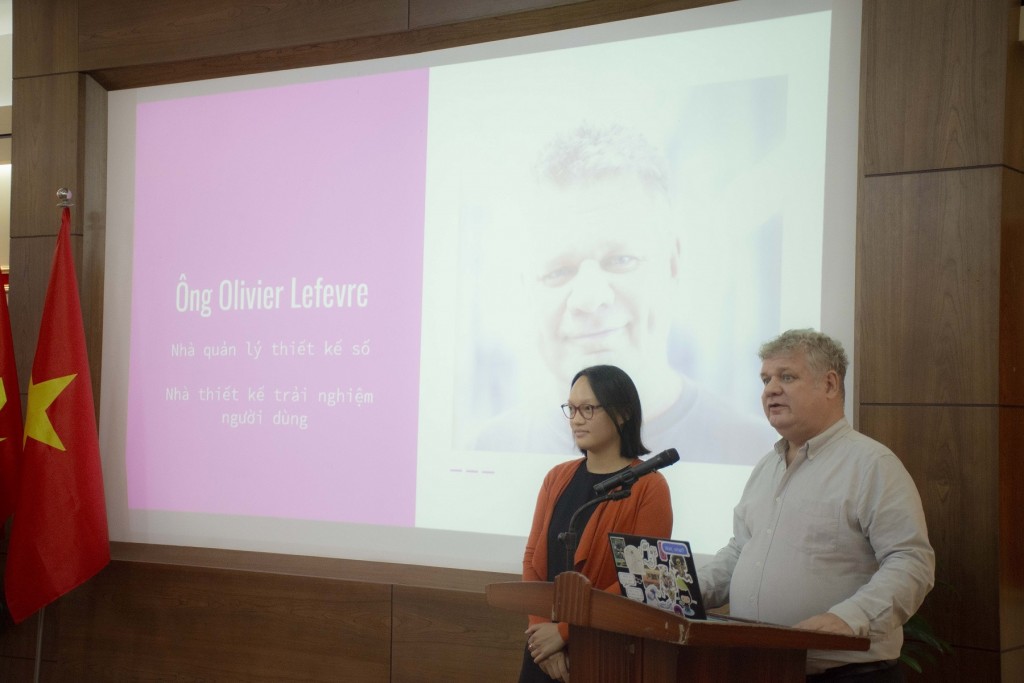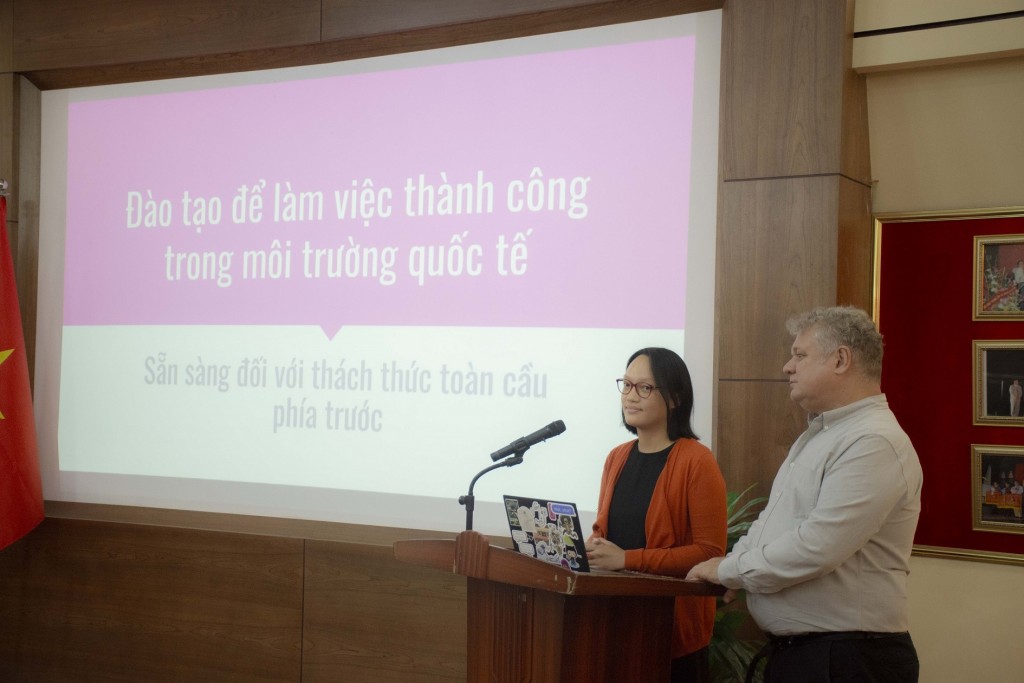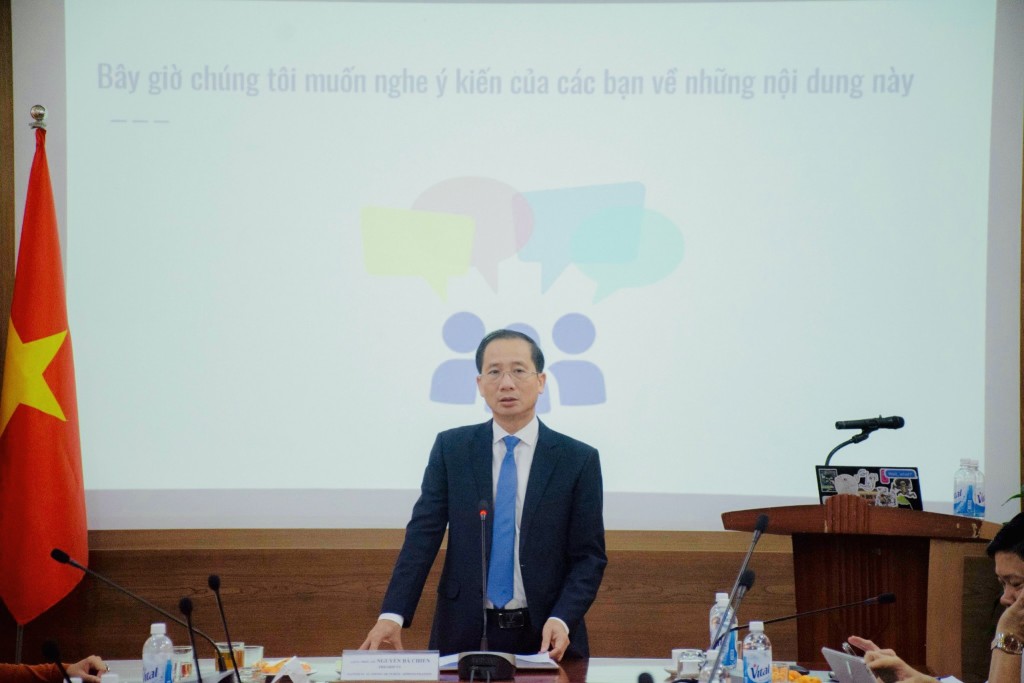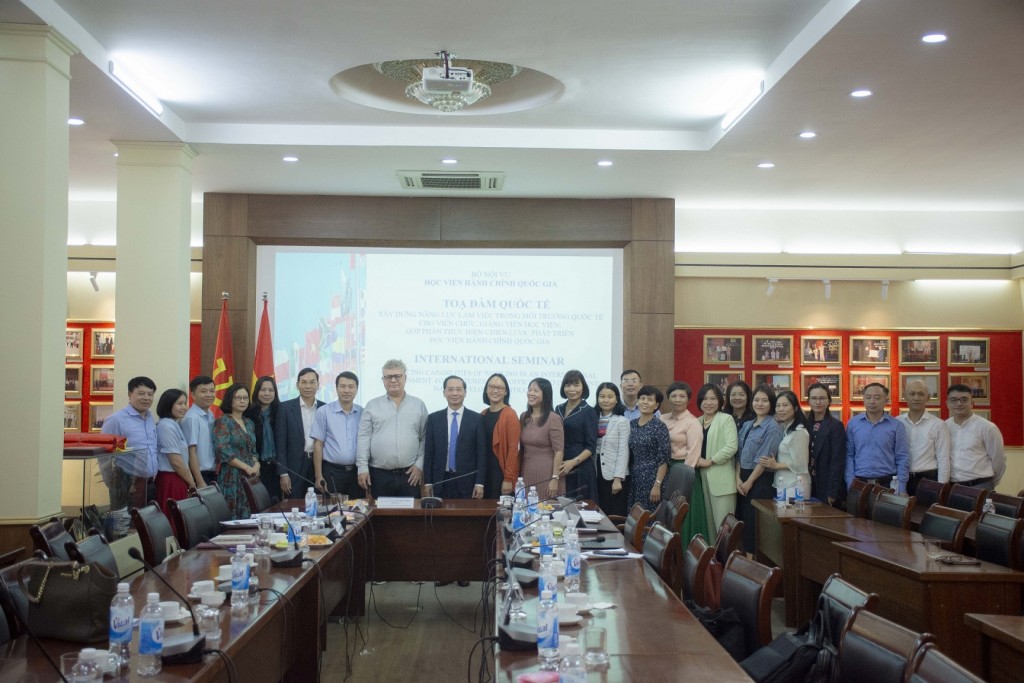On November 8, 2023, the National Academy of Public Administration (NAPA) organized an International Seminar titled “Enhancing capabilities of working in an international environment for lecturers and officials to implement NAPA development strategy”. Assoc. Prof. Dr. Nguyen Ba Chien, NAPA President, chaired the Seminar.
Participating in the Seminar as experts are Dr. Pham Thanh Thao, lecturer and senior consultant from the French Republic; Mr. Olivier Lefevre, lecturer and expert in design thinking, analysis, and problem solving.
On the side of NAPA, there were representatives of leaders of units within and under the Academy along with scientists, lecturers, and officials of NAPA.
In his opening remarks at the Seminar, Assoc. Prof. Dr. Nguyen Ba Chien expressed delight at the presence and active participation of international experts and lecturers of NAPA. He emphasized the need to actively promote international integration among officials, aligning with Resolution No. 26/NQ-TW dated May 19, 2018, of the 7th Central Committee of the 12th National Party Congress. This Resolution has identified specific goals, requirements, and roadmaps for enhancing the staff’s capabilities at all levels to work in an international environment. This is a significant challenge for management entities and officials, requiring all levels and sectors to develop plans for the international integration capacity of officials in agencies and units. Facing this challenge, NAPA has set a vision to become a national center comparable to the Asia-Pacific region in training, research, and policy consultancy in administration, leadership, and management by 2045. To realize this vision, NAPA aims to build a team of officials and lecturers capable of research and teaching on par with the Asia-Pacific region and of working in an international environment. The participation and support of international experts and organizations are crucial in achieving this goal.
As part of the initiative to develop research, teaching, and working capabilities in an international environment for NAPA officials and lecturers, NAPA organized the international seminar titled “Enhancing capabilities of working in an international environment for lecturers and officials to implement NAPA development strategy”.
Assoc. Prof. Dr. Nguyen Ba Chien suggested that delegates focus on discussing, clarifying and answering the following issues:
- The urgency of enhancing capabilities of working in an international environment for NAPA officials and lecturers.
- The international context and requirements posed and the necessary capabilities for NAPA officials and lecturers.
- Survey of capabilities and the demand for developing the capability to work in an international environment for NAPA officials and lecturers.
- Preparation to develop a plan to enhance the teaching, research, and working in the international environment capabilities of NAPA officials and lecturers.
Speaking at the Seminar, Mr. Olivier Lefevre shared about the international work environments and the global landscape with major challenges such as climate change, pandemics, and growing economic interdependence; all of these issues are interconnected and beyond national boundaries, and require international collaboration. No single country can solve any of these global challenges alone anymore. Collaboration is now mandatory to find a path to global solutions.
In today’s interconnected world, international work environments require a unique set of skills and understanding. International work environments bring together people from many different cultures, languages, and backgrounds, and that creates diverse perspectives, different work styles, and cross-border challenges. Embracing diversity in an international work environment can bring various opportunities such as access to a wider talent pool, diverse perspectives and innovative solutions, and global market access. When countries collaborate with each other, cultural diversity becomes a central factor. Cultural diversity impacts communication, negotiation, and problem solving. Working efficiently in this new context requires a set of specific soft skills.
Mr. Olivier Lefevre also brought up common challenges in the international working environment such as challenges due to cultural differences, language barriers, miscommunication and misunderstandings, and stereotyping. He also shared required skills for better cultural understanding such as understanding cultural norms nuances and values, effective cross-cultural communication, cultural sensitivity and respect, adaptability to different cultural contexts, conflict resolution in cross-cultural settings, openness to diverse perspectives, awareness of cultural biases and prejudices, knowledge of global etiquette, empathy and active listening in cross-cultural interactions, identifying and addressing cultural misunderstandings.
Speaking at the Seminar, Dr. Pham Thanh Thao shared about the issue of nurturing the next generation of leaders and experts of NAPA, in which emphasizing investment in human capital. According to her, human resources are the cornerstone of successful international collaboration. Strategic investments in individuals build a knowledgeable and skilled workforce. Well-prepared individuals enhance the reputation and influence of organizations on the international stage. There needs to be an emphasis on education and skills development, with specialized training programs equipping individuals with the expertise required. Continuous learning empowers individuals to excel in international environments; well-prepared individuals bridge cultural gaps and facilitate effective cross-border collaboration. Fostering a global perspective will cultivate an understanding of global challenges; cross-cultural competencies enable effective collaboration in diverse international environments; equipping future leaders with these skills will enhance their capacity to navigate cross-border complexities. Regarding impact and change, well-prepared future leaders have the potential to make a meaningful impact on global challenges. Prepared leaders are instrumental in shaping a more sustainable and interconnected world. They serve as catalysts for innovative solutions and international collaboration, fostering a better global future.
Dr. Pham Thanh Thao also offers necessary skill groups
(1) Communication
- Communication skills: effective cross-cultural communication is key; this includes active listening, asking clarifying questions, and using clear and concise language;
- Language proficiency: having proficiency in other languages can greatly facilitate cross-cultural communication;
- Cultural knowledge: improving cultural knowledge for better cross-cultural interactions;
- Empathy and cultural sensitivity: understanding and respecting the values, customs and beliefs of other cultures is essential;
(2) Attitude:
- Self-awareness: understanding your own cultural biases and values and how these may affect your interactions with others;
- Open-mindedness: a willingness to accept and embrace different ideas, viewpoints, and practices;
- Openness to change: this involves being open to change and new ways of doing things; recognizing that your way may not always be the best or only way;
- Adaptability: the ability to adapt your behavior, communication style, and decision-making to suit different cultural contexts;
- Resilience: remaining resilient in the face of cultural misunderstandings or challenges, and not giving up on building cross-cultural relationships;
(3) Leadership:
- Cross-cultural teamwork: the ability to work effectively in multicultural teams, promoting collaboration and inclusivity;
- Data collection and analysis: This is vital because it provides a foundation for evidence-based decision-making and informed strategies to address global challenges;
- Conflict resolution skills: knowing how to address and resolve conflicts in culturally sensitive ways;
(4) Mindset:
- Continuous learning: always keep learning to better adapt to different cultures and to be an up-to-date specialist;
- Analytical skills: these are essential because they enable individuals to collect, interpret and use data and information to drive informed decisions and address intricate global issues;
- Critical thinking: it is important because it empowers individuals so that they can make informed decisions, solve complex problems, and navigate diverse international challenges effectively;
- Efficiency and effective organizational skills: efficient organization is the art of strategically optimizing tasks and resources to foster a structured and highly productive approach, which minimizes wastage and consistently enhances productivity.
At the Seminar, Dr. Pham Thanh Thao and Mr. Olivier Lefevre also proposed a cross-cultural competence development program focused on developing the teaching, research, and working capacity of NAPA’s officials and lecturers in the international environment. The program has 7 objectives:
To improve the confidence of officials and lecturers to navigate in cross-cultural environment.
To deepen the research and analytical capacities of participants.
To give tools to understand and optimize their own way of working.
To equip participants with advanced skills for effective cross-cultural communication, leadership, and collaboration.
To foster a high level of cultural sensitivity, adaptability, and cultural intelligence in international work environments.
To prepare participants to serve as cross-cultural competence mentors and trainers.
To cultivate the mindset of future researchers and innovators.
Based on the above objectives, the two experts also proposed a training program consisting of 12 expected training modules:
Module 1: Foundations of Cross-cultural Competence (Introduction to cross-cultural competence and its significance; exploring cultural dimensions, frameworks and contexts; self-assessment of participants’ current cross-cultural competence and development plan).
Module 2: Cultural awareness and sensitivity (Understanding and appreciating cultural diversity at a deep level; identifying and addressing common cultural challenges and misunderstandings; advanced cultural sensitivity exercises and assessments).
Module 3: Building self-confidence (Understanding the importance of self-confidence; techniques for cultivating and strengthening self-confidence; utilizing self-confidence in both personal and professional settings).
Module 4: Improving work methods (Recognizing common productivity challenges and obstacles; developing effective work methods; achieving and maintaining optimization).
Module 5: Comprehensive communication abilities (Work efficiently to understand and synthesize the information in an article; be able to summarize and critique an article; communicate in writing, verbally, and to know how to present and introduce yourself).
Module 6: Advanced cross-cultural communication skills (Mastering effective cross-cultural communication strategies and advanced active listening techniques; in-depth study of non-verbal communication, body language, and paralanguage across cultures; simulated cross-cultural negotiation exercises and advanced role-playing scenarios).
Module 7: Navigating complex cultural differences (Analyzing and resolving complex real-world case studies with deep cultural differences; advanced strategies for bridging cultural gaps, conflict resolution, and crisis management; cultural immersion experiences, extensive community interactions, and cultural competency projects).
Module 8: Cross-cultural leadership and management (Leadership in cross-cultural contexts, including leading diverse teams and organizations; strategies for fostering cross-cultural inclusion, equity and diversity; cross-cultural leadership development projects and real-life applications).
Module 9: Building expert cross-cultural competence (Developing advanced empathy, cultural adaptability, and a global mindset; mastery of cross-cultural intelligence (CQ) and cultural competency framework; creating an advanced personal cross-cultural development plan and implementation).
Module 10: Stay informed and forge collaborations (stay updated on articles in the field as well as conferences; identify a research opportunity; establish partnerships).
Module 11: Engage Conference audiences (Effective public speaking in Conferences; handling Q&A sessions with confidence; mastering Conference communication).
Module 12: Mentoring and training in cross-cultural competence (Preparing participants to serve as mentors and trainers in cross-cultural competence; developing curriculum and materials for cross-cultural training programs; Capstone projects to demonstrate mastery and advanced cross-cultural competence).
Through this program, participants will master expert-level cross-cultural competence; become proficient in cross-cultural communication, negotiation, and leadership; acquire deep cultural sensitivity, adaptability, and cultural intelligence; develop the ability to mentor and train others in cross-cultural competence; prepare for leadership roles in the most diverse and complex international work environments.
In his closing remarks at the Seminar, Assoc.Prof. Dr. Nguyen Ba Chien expressed his sincere gratitude to the international experts for their participation and presentation at the Seminar. He hoped that the experts would collaborate with NAPA throughout the entire process of developing and implementing the project to enhance the teaching, research, and working capacity of NAPA’s officials and lecturers in the international environment. The collaboration aims to realize the vision and development strategy of NAPA.


